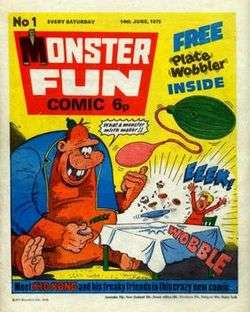Monster Fun
| Monster Fun | |
|---|---|
 Monster Fun #1 (14 June 1975) | |
| Publication information | |
| Publisher | IPC Magazines Ltd |
| Schedule | Weekly |
| Format | Ongoing series |
| Genre | humor, horror |
| Publication date | 14 June 1975 – 30 October 1976 |
| No. of issues | 75 |
| Editor(s) | "Frankie Stein" |
Monster Fun was a weekly British comic strip magazine for children aged seven to twelve. Published by IPC Media, it ran for 73 issues in 1975–1976, when it merged with Buster.[1] Focused on humorous monster strips and stories, the magazine was known for "The Bad Time Bedtime Books" minicomic inserts, created by Leo Baxendale.
The nominal editor was "Frankie Stein" (a play on Frankenstein), a character who had previously appeared in the magazines Wham!, Shiver and Shake and Whoopee!.[1] Recurring artists included Robert Nixon, Tom Williams and Trevor Metcalfe.
The magazine was known for handing out free toys in its issues. The first issue, for instance, came with a free plate wobbler[2] (a novelty item[3] consisting of an inflatable rubber bladder and a hand-operated pump; the bladder is placed under a plate, and inflating it makes the plate wobble).[4] The second issue had a "Freaky Spider Ring", the third a "Super Shaking Skeleton".
Publication history
Monster Fun's debut issue was dated 14 June 1975. Monster Fun Specials were printed in 1975 and 1976.
The magazine merged with Buster to form Buster and Monster Fun after the 30 October 1976 issue.[1] Due to its ongoing popularity, the Monster Fun logo was printed on Buster's cover until the summer of 1979.
Despite its short run, Monster Fun Annuals were printed every year, cover-dated from 1977 until 1985, though all contained some reprint material. They were all distributed in the UK from the autumn of the previous cover-dated year. Buster and Monster Fun Specials were printed (with much reprint material) every year from 1977 until 1996, making them one of the most long-lived of IPC / Fleetway titles. Almost all of the other original strips were reprinted in other titles in the 1980s and 1990s.
After Monster Fun's 1976 merger into Buster, the strips "Gums", "Kid Kong", "X-Ray Specs", "Mummy's Boy", "Draculass", "Teddy Scare", "Terror TV", and "Martha's Monster Make-up" all made the merger.[5]
In February 1982 these merged magazines merged again with Jackpot. "Kid Kong" was terminated on this occasion.
In June 1984 the magazine merged with School Fun. The comic strip "Gums" was terminated on this occasion.
In 1988 the magazine merged with Nipper. "Mummy's Boy" was terminated on this occasion. "X-Ray Specs" had the most longevity continuing until Buster's end (4 January 2000) though as with the all but one of the last Buster strips as reprints.
List of strips
Original strips
- "Mummy's Boy" (1975-1988), (drawn by Norman Mansbridge)
- "X-Ray Specs" (1975-2000), drawn by Mike Lacey
- "Arts Gallery" (drawn by Mike Lacey)
- "Martha's Monster Make-up" (1975-1977) (drawn by Ken Reid)
- "March of the Mighty Ones"
- "Brainy and his Monster Maker"
- "Cinders"
- "Creature Teacher" (drawn by Thomas Williams)
- "Dough Nut & Rusty" (drawn by Trevor Metcalfe)
- "Draculass" (1975-1977) (drawn by Terry Bave)
- "Grizzly Bearhug"
- "The Invisible Monster"
- "Kid Kong" (1975-1982) (drawn by Robert Nixon)
- "Major Jump Horror Hunter"
- "Monster Hits Jokes"
- "Tom Thumbscrew"
Later strips
- "Gums" (1976-1984) by Roy Davies and Robert Nixon
- "Teddy Scare" (1976-1977) by Barrie Appleby
- "Terror TV" (1976-1978) (drawn by Ian Knox)
- "Frankie's Diary"
- "Freaky Farm" (drawn by Jim Watson)
- "The Little Monsters"
- "S.O.S. Save Our Stan" as well as many pull-out posters
References
- 1 2 3 "Monster Fun," ComicVine. Accessed 21 September 2015.
- ↑ Monster Fun #1 (14 June 1975).
- ↑ Stringer, Lew (3 December 2010). "Blimey! It's another blog about comics!: Free Inside! - Part 5". Retrieved 12 February 2013.
- ↑ Kibble-White, Graham (2005). The Ultimate Book of British Comics. Allison & Busby. p. 175. ISBN 9780749082116.
- ↑ Buster #19761106 (6 November 1976).